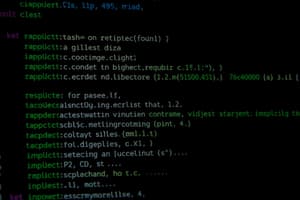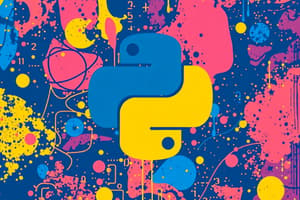Podcast
Questions and Answers
What is a key feature of Python that contributes to its ease of learning?
What is a key feature of Python that contributes to its ease of learning?
- Complex syntax for greater flexibility
- Use of semicolons to end statements
- Requirement to declare variable types explicitly
- Clear syntax and readability (correct)
Which of the following allows Python to execute code line-by-line?
Which of the following allows Python to execute code line-by-line?
- Interpreted language feature (correct)
- Multi-threading capability
- Compiled language feature
- Static typing feature
What type of programming paradigm does Python support?
What type of programming paradigm does Python support?
- Object-oriented programming (correct)
- Only functional programming
- Assembly language programming
- Procedural programming only
Which of the following libraries is associated with data visualization in Python?
Which of the following libraries is associated with data visualization in Python?
What is the purpose of try-except blocks in Python?
What is the purpose of try-except blocks in Python?
What type of data structure is represented by my_dict = {'key': 'value'}?
What type of data structure is represented by my_dict = {'key': 'value'}?
Which of the following is the correct way to create a function in Python?
Which of the following is the correct way to create a function in Python?
What is the role of pip in Python development?
What is the role of pip in Python development?
Flashcards are hidden until you start studying
Study Notes
Python Overview
- High-level, interpreted programming language.
- Created by Guido van Rossum, first released in 1991.
- Emphasizes code readability and simplicity.
Key Features
- Ease of Learning: Clear syntax and readability make it beginner-friendly.
- Interpreted Language: No need for compilation; code is executed line-by-line.
- Dynamically Typed: No need to declare variable types explicitly.
- Object-Oriented: Supports object-oriented programming paradigms.
- Large Standard Library: Extensive built-in modules for various tasks.
Common Uses
- Web Development: Frameworks like Django and Flask.
- Data Science & Analytics: Libraries such as NumPy, Pandas, and Matplotlib.
- Machine Learning: Libraries like TensorFlow, Keras, and scikit-learn.
- Scripting and Automation: Used for task automation in various applications.
- Game Development: Libraries like Pygame for building games.
Basic Syntax
- Variables: Dynamic typing; e.g.,
x = 5,name = "Python". - Control Structures:
- Conditional Statements:
if,elif,else. - Loops:
for,while.
- Conditional Statements:
- Functions: Defined using the
defkeyword; e.g.,def my_function():. - Data Structures:
- Lists: Ordered and mutable; e.g.,
my_list = [1, 2, 3]. - Tuples: Ordered and immutable; e.g.,
my_tuple = (1, 2, 3). - Dictionaries: Key-value pairs; e.g.,
my_dict = {'key': 'value'}.
- Lists: Ordered and mutable; e.g.,
Important Concepts
- Indentation: Significant for defining code blocks; no braces or semicolons.
- Modules and Packages: Encapsulate related functionalities; imported using
importstatement. - Exception Handling: Try-except blocks to manage errors gracefully.
- List Comprehensions: Concise way to create lists; e.g.,
[x**2 for x in range(10)].
Development Environment
- IDE/Editors: PyCharm, VSCode, Jupyter Notebook.
- Package Management: Use
pipfor installing external libraries.
Community and Resources
- Extensive online community and resources available (tutorials, forums, documentation).
- Python Software Foundation maintains the language and its ecosystem.
Python Overview
- Created by Guido van Rossum in 1991
- Emphasizes code readability and simplicity
Python Features
- Beginner-friendly due to clear syntax and readability
- Code executed line-by-line without explicit compilation
- No need to specify variable types
- Supports object-oriented programming paradigms
- Offers a wide range of built-in modules for various tasks
Python Use Cases
- Web development using frameworks like Django and Flask
- Data Science & Analytics with libraries such as NumPy, Pandas, and Matplotlib
- Machine Learning using TensorFlow, Keras, and scikit-learn
- Task automation in various applications
- Game Development with libraries like Pygame
Python Syntax Essentials
- Variables dynamically typed:
x = 5,name = "Python" - Control structures using
if,elif,elsefor conditions andfor,whilefor loops - Functions defined with the
defkeyword:def my_function(): - Data structures include lists, tuples, and dictionaries
Python Data Structures
- Lists: Ordered and mutable sequences e.g.,
my_list = [1, 2, 3] - Tuples: Ordered and immutable sequences e.g.,
my_tuple = (1, 2, 3) - Dictionaries: Key-value pairs e.g.,
my_dict = {'key': 'value'}
Python Important Concepts
- Indentation defines code blocks, no braces or semicolons
- Modules and packages encapsulate functionalities,
importused to access them - Exception handling uses try-except blocks for graceful error management
- List comprehensions offer concise list creations, e.g.,
[x**2 for x in range(10)]
Python Development Environment
- IDE/Editors like PyCharm, VSCode, Jupyter Notebook
pipused for installing external libraries
Python Community and Resources
- Active online community and resources including tutorials, forums, and documentation
- Python Software Foundation manages the language and its ecosystem
Studying That Suits You
Use AI to generate personalized quizzes and flashcards to suit your learning preferences.




